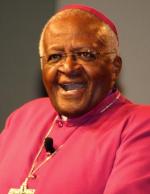 Retired Archbishop Desmond Tutu helped launch a Truth and Reconciliation Commission (TRC) in Solomon Islands on 29th April. The Nobel Laureate, who was integral to South Africa’s truth and reconciliation process, launched the commission at a ceremony attended by thousands in the capital Honiara. Prime Minister Dr Derek Sikua said that the TRC launch marks an important step in the history of the country as it attempts to deal with a difficult chapter.
Retired Archbishop Desmond Tutu helped launch a Truth and Reconciliation Commission (TRC) in Solomon Islands on 29th April. The Nobel Laureate, who was integral to South Africa’s truth and reconciliation process, launched the commission at a ceremony attended by thousands in the capital Honiara. Prime Minister Dr Derek Sikua said that the TRC launch marks an important step in the history of the country as it attempts to deal with a difficult chapter.
Between 1998 and 2003, when Australia sent in troops to calm the situation, the Solomon Islands suffered a period of violence and lawlessness with many killings and thousands displaced. The TRC will provide a forum for victims and perpetrators of the conflict to speak about the causes and impacts of the violence. Thousands are expected to tell their stories during the two-year process.
Many people didn’t believe that South Africa would ever become a united and peaceful country, said Archbishop Tutu, but thanks to the prayers of many around the world, people chose forgiveness and reconciliation instead of revenge and retribution. He said that what had happened in South Africa would also happen in Solomon Islands.
‘God loves all of you very much. Sometimes when things do not go well, you wonder whether you are only God’s step-children.
‘No you are not God’s step-children. You are God’s children and he loves you and wants you to prosper. He wants you to be united and God wants you to live in peace together,’ said Tutu.
The Archbishop also spoke at a three-day conference on ‘Reconciliation – the way forward’, organized by Winds of Change, the Initiatives of Change group in Solomon Islands. Speaking at the conference, Governor General Sir Nathaniel Waena told Tutu: ‘You are here by divine providence, and you have come with a spiritual message to our people, who are in real need, to be reconciled in truth, by the power of the living God.'
Reconciliation in action was demonstrated by an ex-combatant and founder of the Malaita Eagle Force (MEF) who told the conference that he was ready to forgive the men who had killed his father. ‘In a few months time I and my family will be reconciling with my brothers and sisters from Guadalcanal,’ said Andrew Fioga. ‘During the reconciliation ceremony, they will return the remains of my father.’
He told the conference that revenge was the reason that he and others had founded the MEF after fellow Malaitans were killed or driven from their homes on the island of Guadalcanal. ‘Since I and others started the war, I will also start the healing process... I am now a changed man and I’m ready to forgive those who killed my father.’
Fioga was among a number of ex-militants attending the conference. Topics included, ‘Heart of Reconciliation and Transformation’, ‘Honesty that brings change personally and nationally’, Courage to face the truth’, ‘Acts of healing, acts of transformation’ and ‘The key to good leadership and good governance’. Speakers included Niketu Iralu, convenor of the Naga Churches Coordination Committee for Healing and Reconciliation in Nagaland, Revd Prof James Haire, director of the Australian Centre for Christianity and Culture, and Kenyan journalist Bedan Mbugu who had been jailed for courageously exposing corruption at the highest levels in his country.
Closing the conference on 1st May, Sir Peter Kenilorea, Speaker of Parliament, said that reconciliation must take place at all levels of society. ‘Whether at political, economic or social levels, I believe it is important that we ensure our actions... should be ones that strengthen and unite our nation.’
by Mike Lowe, from reports in the Solomon Star. A fuller report will follow.

